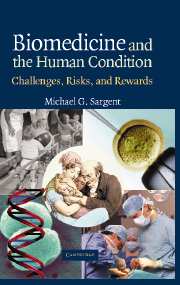Book contents
- Frontmatter
- Contents
- Preface
- 1 Challenges, Risks, and Rewards: Learning to Control Our Biological Fate
- 2 Learning to Breed Successfully
- 3 How Life is Handed On
- 4 Cells in Sickness and Health
- 5 Experiences in Utero Affect Later Life
- 6 Infection, Nutrition, and Poisons: Avoiding an Unhealthy Life
- 7 Signs of Ageing: When Renovation Slows
- 8 Cancer and the Body Plan: A Darwinian Struggle
- 9 Fighting Infection
- 10 Are Devastating Epidemics Still Possible?
- 11 Discovering Medicines: Infinite Variety through Chemistry
- 12 Protein Medicines from Gene Technology
- 13 Refurbishing the Body
- 14 Living with the Genetic Legacy
- 15 Epilogue: Signposts to “Wonderland”
- References
- Index
6 - Infection, Nutrition, and Poisons: Avoiding an Unhealthy Life
Published online by Cambridge University Press: 06 August 2009
- Frontmatter
- Contents
- Preface
- 1 Challenges, Risks, and Rewards: Learning to Control Our Biological Fate
- 2 Learning to Breed Successfully
- 3 How Life is Handed On
- 4 Cells in Sickness and Health
- 5 Experiences in Utero Affect Later Life
- 6 Infection, Nutrition, and Poisons: Avoiding an Unhealthy Life
- 7 Signs of Ageing: When Renovation Slows
- 8 Cancer and the Body Plan: A Darwinian Struggle
- 9 Fighting Infection
- 10 Are Devastating Epidemics Still Possible?
- 11 Discovering Medicines: Infinite Variety through Chemistry
- 12 Protein Medicines from Gene Technology
- 13 Refurbishing the Body
- 14 Living with the Genetic Legacy
- 15 Epilogue: Signposts to “Wonderland”
- References
- Index
Summary
The Israelites believed all ill health was caused by the Almighty's displeasure, and the idea persisted in some parts of Christian society for more than two millennia. Today, we understand that the good health, and indeed the survival, of any mammal depends on three things: resistance to infectious disease, an appropriate diet, and avoidance of poisonous substances. Our defences against microbes are complicated and powerful, and although they may protect us, they can also create symptoms of disease. We can define our dietary requirements as never before and can recognise that deficiencies of these nutrients have blighted human societies throughout history, although we still have some way to go to ensure the optimum micronutrient intake. The human body is vulnerable to poisons in plant foods and to environmental pollution, in spite of the extraordinary powers we have to detoxify natural and man-made poisons. This chapter tells the story of how, in the twentieth century, we came to understand some of the requirements for a healthy life.
Microbes – Historic Enemies
Microbes are nature's greatest opportunists; their almost infallible capacity to exploit any chemical as a nutrient allows them to take advantage of virtually any ecological niche, using their astonishing speed of multiplication and genetic adaptability. Every external and internal surface of the mammalian body is constantly under siege from microbes. Exterior surfaces are effective physical barriers to almost all microbes, but dynamic multilayered defences of a more subtle kind also protect against this perpetual threat.
- Type
- Chapter
- Information
- Biomedicine and the Human ConditionChallenges, Risks, and Rewards, pp. 112 - 131Publisher: Cambridge University PressPrint publication year: 2005



